The news about extreme-weather events since 2023 has been nearly unrelenting:
Atmospheric rivers unleashed flooding in California; deadly wildfires in
Canada,
Maui
and Texas; tornadoes and cyclones in regions as far-flung as Southeast
Africa, Myanmar and Mississippi. Not to mention the widespread
droughts and heatwaves: The US set a record in 2023 with 28 extreme-weather
events costing $1 billion or more, surpassing the previous record of 20 such
events in 2020, according to the National Centers for Environmental
Information (NCEI). The total US
price tag in 2023 came to at least $92.9 billion.
Unprecedented weather is expected to continue through 2024. The NCEI
reports
this past January broke record temperatures — prolonging a trend that started in
2023, which was the hottest year on record. The European Center for
Medium-Range Forecasts (ECMRF) found that the worldwide temperature in
2023 was 1.5°F above the historical average from 1960-2022. When the ECMRF
separated over-ocean and land-surface temperatures, the land-surface temperature
has risen an alarming 2.23°F above the 1960-2022 average.
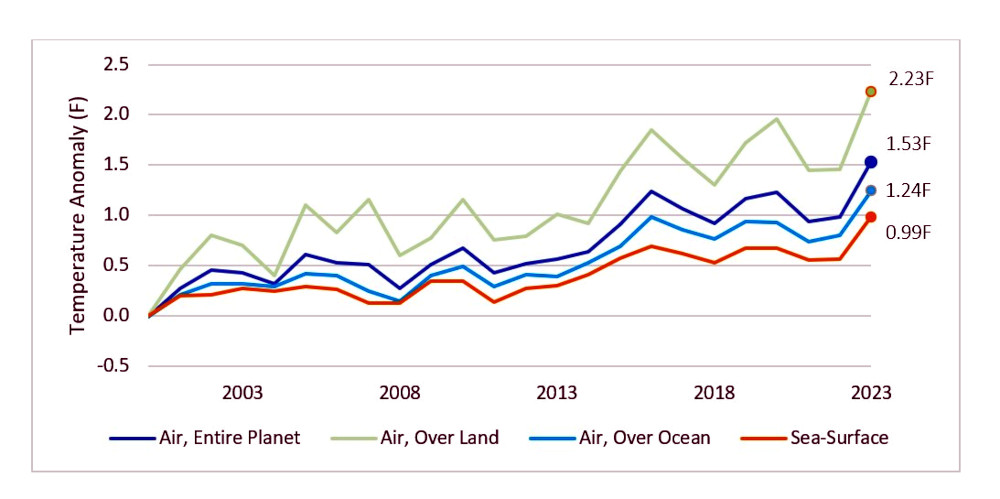 Global average anomalies: Air-over-land, air-over-oceans, sea-surface and air-entire planet (Graph from the SOA Research Institute’s Actuarial Weather Extreme Series: 2023 Was the Hottest Year on Record)
Global average anomalies: Air-over-land, air-over-oceans, sea-surface and air-entire planet (Graph from the SOA Research Institute’s Actuarial Weather Extreme Series: 2023 Was the Hottest Year on Record)
To gauge how risk professionals and consumers across demographics perceive
extreme-weather events, the Society of Actuaries (SOA) Research
Institute conducted several
surveys in 2023. The responses indicate an intensifying concern about extreme
weather, as it is more directly impacting people’s daily lives.
As pandemic worries lessen, risk managers focus on extreme weather
Each year, the SOA Research Institute conducts its annual survey of risk
managers
across the globe about what they considered to be the top emerging risks;
climate has dominated the list for the past five years. In 2023, risk managers
again chose climate change by a large margin — with disruptive
technology
coming in a distant second.
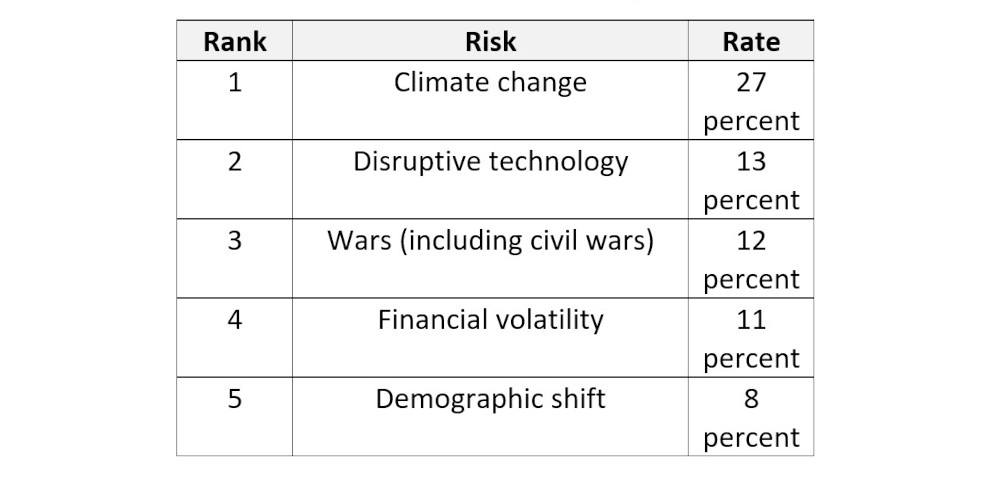 Risk managers’ choices for top emerging risk in 2023 (Graph from the SOA Research Institute’s 17th Annual Survey of Emerging Risks — Key Findings)
Risk managers’ choices for top emerging risk in 2023 (Graph from the SOA Research Institute’s 17th Annual Survey of Emerging Risks — Key Findings)
Additionally, in light of the extreme weather events in 2023, it isn’t
surprising that natural catastrophes surged as an emerging risk. And when risk
managers were asked to provide three combinations of two risks, natural
disasters were the risk chosen most often as part of those combinations —
hitting new highs as shown in the graph below:
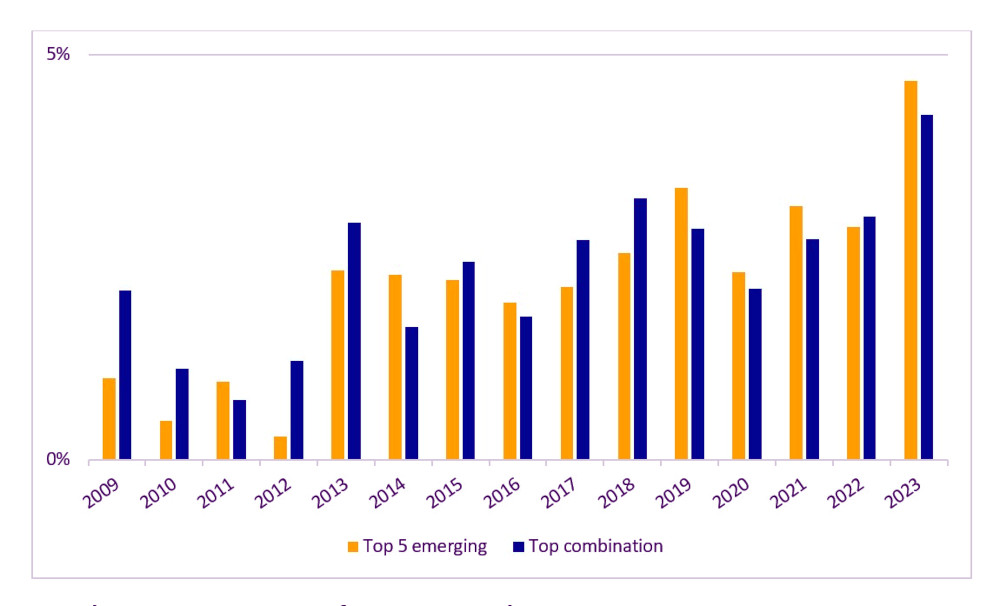 Natural catastrophes: Severe weather (except tropical storms); historical results of risk manager responses, 2009-2023 (Graph from the SOA Research Institute’s 17th Annual Survey of Emerging Risks — Key Findings)
Natural catastrophes: Severe weather (except tropical storms); historical results of risk manager responses, 2009-2023 (Graph from the SOA Research Institute’s 17th Annual Survey of Emerging Risks — Key Findings)
Feeling impacts of extreme weather in the US
In June 2023, the SOA Research Institute conducted an online survey of 2,000 US
respondents; and the majority reported that extreme-weather events — including
hurricanes, tornadoes, heatwaves, wildfires and flooding — have had negative
impacts on their feelings of general safety (65 percent), communities (58
percent), personal health (53 percent), and property (51 percent).
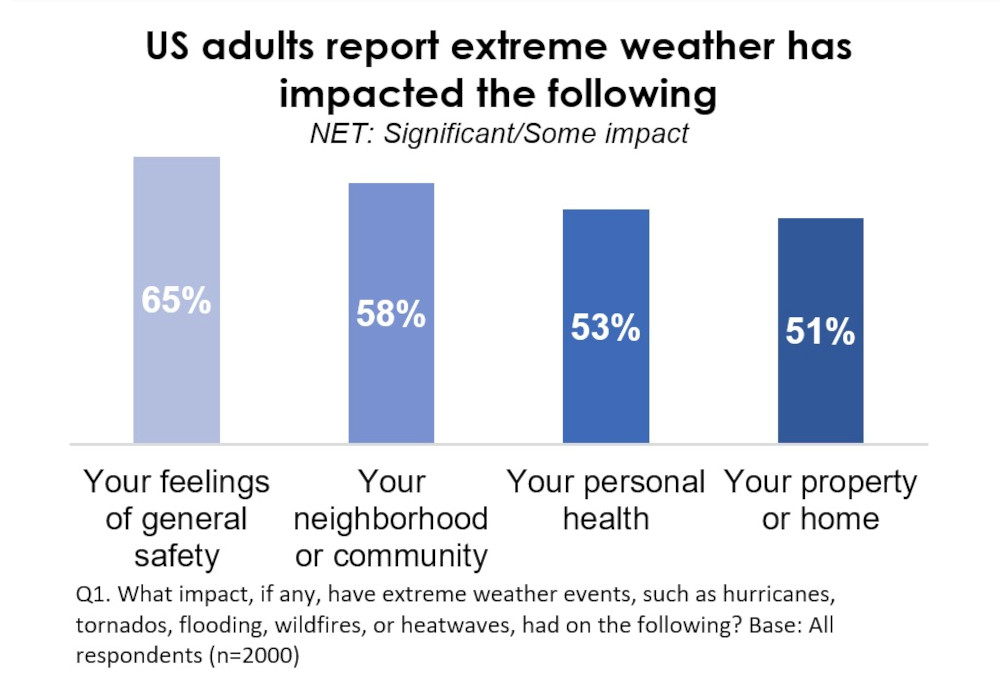
Additionally, respondents reported the following health effects:
-
Two in five (42 percent) said that it has caused short-term injury and/or
illness.
-
Over one-fifth (23 percent) reported extreme weather events have caused
complications to existing chronic conditions.
-
15 percent reported extreme weather events caused long-term injury and/or a
chronic condition.
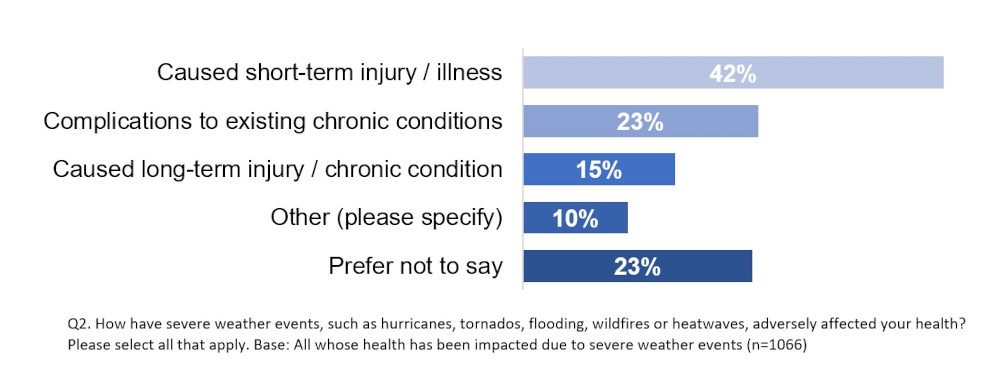
Taking a closer look at health impacts by region and ethnicity, survey findings
revealed that respondents from the US West (58 percent) were the most likely
to note health impacts due to extreme weather. They were closely followed by the
US Northeast (56 percent), the US South (53 percent) and the US
Midwest (47 percent). Furthermore, 70 percent of Asian Americans cited
health impacts, along with 62 percent of Hispanic/Latino Americans and 57
percent of African Americans — all higher than white Americans at 52
percent.
Additionally, 41 percent of US adults surveyed expect climate change to
negatively affect their health over the next one to five years — with 11 percent
expecting that negative impact to be significant.
“The research has highlighted the impacts of extreme weather events and trends,”
said Robert Montgomery,
Project Manager of the SOA Research Institute Catastrophe and Climate Strategic
Research Program. “An understanding of climate-risk
trends
can help drive consumer choices — such as where to
live,
what types of materials to build with, and what infrastructure to develop and
energy to rely on.”
The generational divide in sustainable investing
Extreme-weather events are also impacting investment decisions. 35 percent of
respondents to the 2023 consumer survey made investments or considered investing
in companies involved in making sustainable improvements to the environment.
However, financial considerations based on sustainability show generational
differences.
Below is the percentage of respondents by generation who have invested or are
considering investing in companies making environmentally sustainable
improvements:
-
47 percent of Gen Zers (aged 18 – 25)
-
52 percent of Millennials (aged 26 – 42)
-
33 percent of Gen Xers (aged 43 – 57)
-
15 percent of Baby Boomers (aged 58 – 76)
-
16 percent of the Silent Generation (aged 77+)
For more information and to download other SOA Research Institute climate risk
research, visit the Catastrophe and Climate Strategic Research
page.
You can also download the Climate Risk Consumer Survey
Report
for more findings on perceptions of climate change’s impacts in the US.
Get the latest insights, trends, and innovations to help position yourself at the forefront of sustainable business leadership—delivered straight to your inbox.
R. Dale Hall, FSA, MAAA, CERA is managing director of the Society of Actuaries Research Institute.
Published Mar 22, 2024 8am EDT / 5am PDT / 12pm GMT / 1pm CET